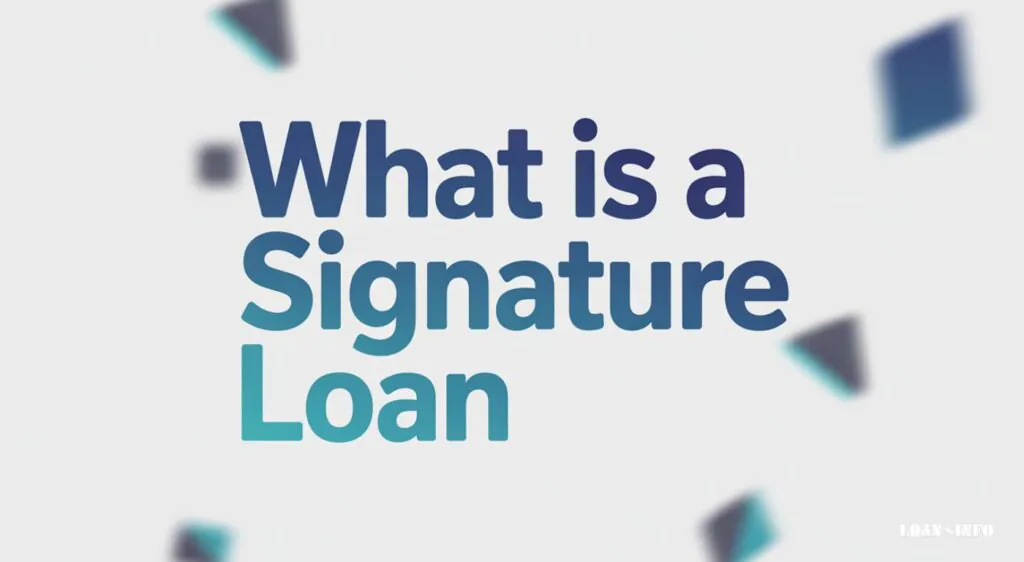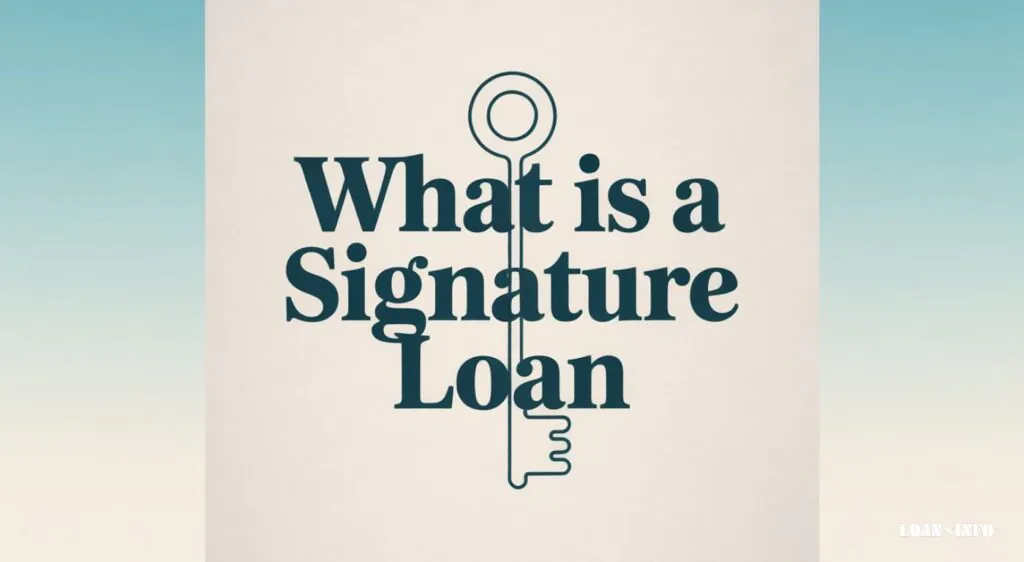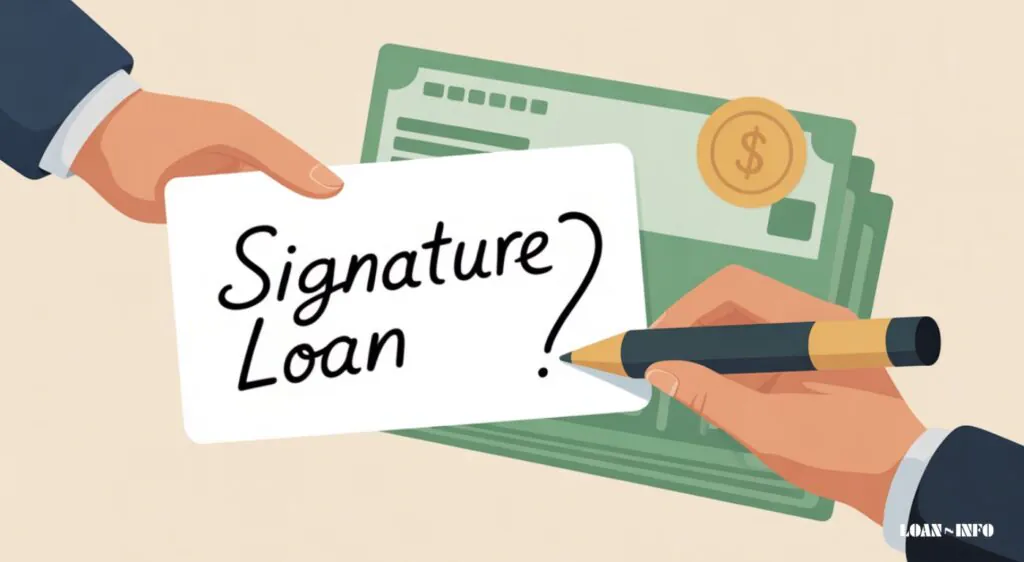When money is tight and you don’t want to risk your assets, a signature loan can be an option worth considering. This type of personal loan is often called a good faith loan or a character loan, because it relies only on your promise to repay instead of collateral like a car or house.
Unlike secured loans, these are collateral-free loans that depend on your income and credit profile. Many Americans use them for emergencies, large purchases, or debt consolidation. Understanding how they work, their benefits, and their risks is the first step in deciding whether a signature loan is right for you.
What Is a Signature Loan?
A signature loan is a type of personal loan that only needs your promise to repay. It is also known as a collateral-free loan or personal loan without collateral. You don’t have to pledge a car, house, or savings account. Instead, lenders rely on your credit score and credit history to decide if you are trustworthy.

These loans are usually a term loan or an unsecured term loan, which means you repay them in set installments. A loan repayment schedule often ranges from one to five years, with equal monthly payments until the balance is cleared.
How Does a Signature Loan Work?
When you apply, the loan application process online is usually simple. Most banks, credit unions, and online lenders will check your credit report, request income verification, and sometimes ask about co-signer requirements if your profile is weak.
If approved, you receive a lump sum, and repayment begins the following month. Many lenders advertise fast approval loans and even offer same-day loan funding or a next business day deposit. The speed often depends on whether you apply with banks, credit unions, or online lenders.
Signature Loan vs Personal Loan
A signature loan is technically a type of personal loan, but there are slight differences. Some lenders market them as installment loans online, while others reserve the term for loans that rely only on your signature.
Unlike secured personal loans, you don’t need collateral such as your car or house. However, interest can be higher, especially if your credit score eligibility is borderline.
Signature Loan vs Revolving Credit
Revolving credit like a credit card or line of credit works differently. With revolving credit, you can borrow, repay, and borrow again. By contrast, a signature loan is an installment product with fixed terms.
The benefit of a signature loan is that you know your Annual Percentage Rate (APR), repayment amount, and end date. A credit card, on the other hand, may trap you with high interest and never-ending debt if you only make minimum payments.
Secured Loans vs Unsecured Loans: Where Do Signature Loans Fit?
A secured loan requires collateral, like a car title or mortgage. If you fail to pay, the lender takes the asset. A signature loan is an unsecured loan, meaning no property backs it.
Because it is riskier for lenders, interest rates are often higher compared to secured options. Still, many borrowers choose unsecured personal loans to avoid losing property if something goes wrong.
Common Uses of a Signature Loan
Most people use a signature loan as a debt consolidation loan, rolling multiple balances into one lower-rate payment. This is common for credit card consolidation because interest rates on personal loans are usually lower than those of a credit card.
Other uses include medical emergency loans, wedding loans, or vacation loans. Some also finance home improvement projects. These uses show how flexible and practical a signature loan can be for different stages of life.
How Much Can You Borrow With a Signature Loan?
Loan amounts usually range between $500–$100,000. The exact figure depends on your credit score, income, and chosen lender. Some lenders, like Lightstream, offer larger sums for borrowers with excellent profiles.
Here’s a quick comparison:
| Lender Type | Loan Limits | Notes |
|---|---|---|
| Banks | $1,000–$50,000 | Often require strong credit history |
| Credit unions | $500–$40,000 | May have membership requirements |
| Online lenders | $1,000–$100,000 | Known for fast approval loans |
Eligibility and Requirements for a Signature Loan
To qualify, lenders check credit history requirements, credit score eligibility, and income verification. Many prefer borrowers with scores above 650. Lower scores may need a co-signer.
Documents like pay stubs, W-2s, or tax returns are required. A credit report from agencies like Experian or Equifax will also be pulled. You can check yours at AnnualCreditReport.com for free.
Pros and Cons of Signature Loans
The pros and cons of unsecured loans are important to weigh. Pros include quick funding, no need for collateral, and flexible use of funds. Many also like that rates are lower than those of a credit card.

The cons include higher rates than secured loans, strict approval standards, and possible loan origination fees or prepayment penalties. Missing payments can also hurt your credit score and damage your financial future.
Where to Get a Signature Loan
You can find signature loans at banks, credit unions, or through online lenders. Each has strengths. Banks may offer loyalty discounts. Credit unions usually charge lower interest rates on personal loans, but they often have membership requirements. Online lenders are popular for same-day funding and easier applications.
The right choice depends on your need for speed, your credit profile, and whether you already have a relationship with the institution.
How to Apply for a Signature Loan Successfully

To boost your approval odds, start by checking your credit report. Fix errors with each credit agency before applying. Then, prequalify with multiple lenders. This step shows estimated APR without hurting your score.
The loan application process online is fast. Gather documents like ID, proof of address, and pay stubs. Once approved, sign the agreement. Funds are usually deposited as same-day funding or within two days.
Final Conclusion— Are Signature Loans Right for You?
A signature loan is useful when you need quick money without risking property. It can help with debt consolidation, covering emergencies, or funding big events. If you have a stable income and a decent credit history, it may be the right choice.
However, remember the risks. High APR, strict credit score eligibility, and possible origination fees mean it isn’t perfect for everyone. Before you sign, compare offers from banks, credit unions, and online lenders. Borrow only what you can repay on time.
Frequently Asked Questions
How does a signature loan work?
A signature loan gives you a lump sum upfront, and you repay it in fixed monthly installments over a set term.
Is it hard to get a signature loan?
It depends on your credit score and income; borrowers with strong credit histories usually qualify more easily.
How much money can you get on a signature loan?
Loan amounts usually range from $500 to $100,000, based on lender policies and borrower eligibility.
What’s the difference between a signature loan and a line of credit?
A signature loan is a one-time lump sum, while a line of credit allows ongoing borrowing up to a limit.
Can I pay off a signature loan early?
Yes, you can, but some lenders may charge prepayment penalties for early payoff.
What credit score is needed for a signature loan?
Most lenders prefer a credit score of 660 or higher, though some accept lower with a co-signer.
More Posts:
